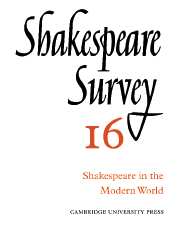Book contents
- Frontmatter
- An Obligation to Shakespeare and the Public
- Our Closeness to Shakespeare
- The Popularity of Shakespeare: An Examination of the Royal Shakespeare Theatre’s Repertory
- Shakespeare and the Fashion of These Times
- An Approach to Shakespearian Tragedy: The ‘Actor’ Image in Macbeth
- Shakespeare’s Impact Today in France
- Shakespeare and the Modern World
- Modern ‘Theatrical’ Translations of Shakespeare
- Shakespeare as ‘Corrupter of Words’
- Shakespeare in Ghana
- ‘Timon of Athens’
- Who Strutted and Bellowed?
- Shakespeare in Planché’s Extravaganzas
- ‘Our Will Shakespeare’ and Lope de Vega: An Unrecorded Contemporary Document
- Shakespeare and the Mask
- International Notes
- Shakespeare Productions in the United Kingdom: 1961
- Acting Shakespeare Today. A review of performances at the Royal Shakespeare Theatre, August 1962
- Canada’s Achievement
- 1 Critical Studies
- 2 Shakespeare’s Life, Times and Stage
- 3 Textual Studies
- Books Received
- Index
- Plate section
Shakespeare in Ghana
Published online by Cambridge University Press: 28 March 2007
- Frontmatter
- An Obligation to Shakespeare and the Public
- Our Closeness to Shakespeare
- The Popularity of Shakespeare: An Examination of the Royal Shakespeare Theatre’s Repertory
- Shakespeare and the Fashion of These Times
- An Approach to Shakespearian Tragedy: The ‘Actor’ Image in Macbeth
- Shakespeare’s Impact Today in France
- Shakespeare and the Modern World
- Modern ‘Theatrical’ Translations of Shakespeare
- Shakespeare as ‘Corrupter of Words’
- Shakespeare in Ghana
- ‘Timon of Athens’
- Who Strutted and Bellowed?
- Shakespeare in Planché’s Extravaganzas
- ‘Our Will Shakespeare’ and Lope de Vega: An Unrecorded Contemporary Document
- Shakespeare and the Mask
- International Notes
- Shakespeare Productions in the United Kingdom: 1961
- Acting Shakespeare Today. A review of performances at the Royal Shakespeare Theatre, August 1962
- Canada’s Achievement
- 1 Critical Studies
- 2 Shakespeare’s Life, Times and Stage
- 3 Textual Studies
- Books Received
- Index
- Plate section
Summary
When Ben Jonson wrote his eulogy on ‘Master William Shakespeare and what he has left us’, he may have had some idea of the temporal, but little conception of the territorial, extension of ‘Master William’s fame. Jonson could not possibly have foreseen to what extent Shakespeare’s ‘buskin’ was ‘to shake a stage’ in the various dim and then little-known corners of the world. He might quite easily have dismissed the idea of a Shakespearian production in the Americas as unlikely, whilst, if he had considered the matter at all, the suggestion of a performance in febrile West Africa, where, according to Hakluyt, sailors such as Job Hartop called from time to time, would have seemed to him like the ravings of a plague-struck mariner. Yet Shakespeare’s ‘unblotted’ and Marlowe’s ‘mighty’ lines are now frequently heard in that part of Africa which, until the comparatively recent years of anti-malarial drugs, has long been known as ‘the white man’s grave’. In attempting to describe some of the problems confronting the teacher and producer of Shakespeare in West Africa, I shall confine my comments to questions which arose out of my experience of lecturing on Shakespeare to training college students in Ghana, but I tentatively suggest that these are fundamental questions to any teacher who is concerned with the explanation of English literature to students whose mother-tongue is not English.
- Type
- Chapter
- Information
- Shakespeare Survey , pp. 77 - 82Publisher: Cambridge University PressPrint publication year: 1963

